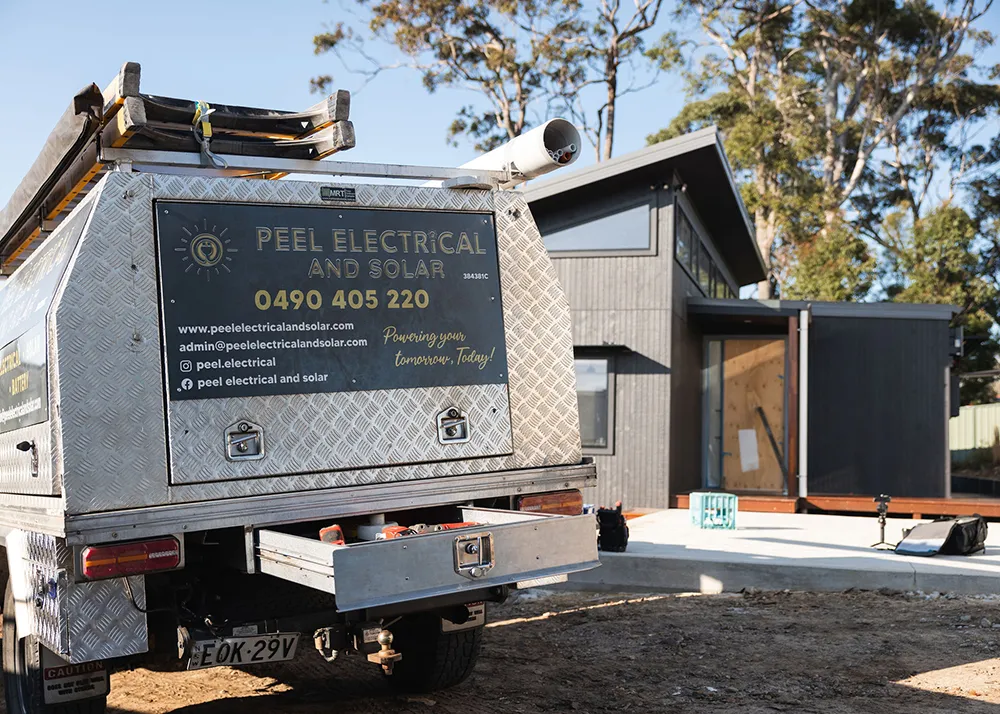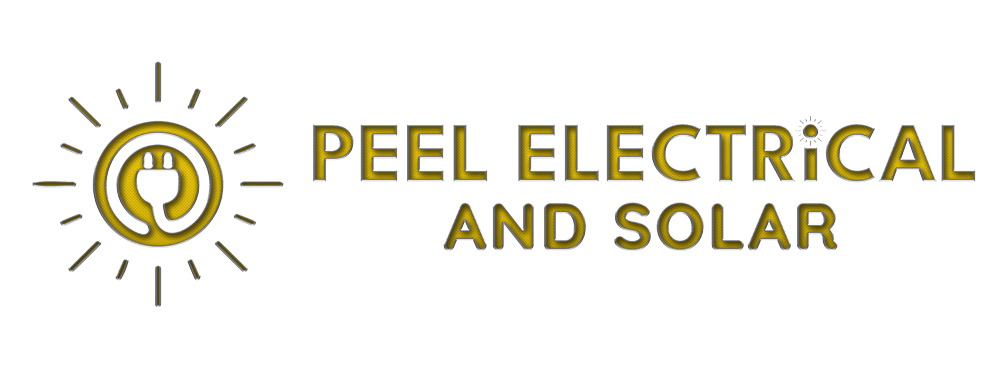Contact Us

Get in Touch
We’d love to hear about your project, challenge, or opportunity.
Contact info
Our Office
209 Princes Hwy, Ulladulla NSW 2539, Australia
Our Phone Number
0490405220
Office hours
Monday to Friday: 9 am to 5 pm
Saturday: 11am to 4 pm
Sunday: by appointment
Frequently Asked Questions
At Peel electrical and Solar, we’re not just your local electrical and solar experts; we’re your neighbours, dedicated to lighting up homes and businesses with sustainable energy solutions. As a trusted family-owned business, we bring years of experience and a passion for renewable energy to every project.
When every second counts, trust Peel electrical and solar to be your reliable partner in electrical emergencies. With our lightning-fast response time, we’re here to restore power and peace of mind when you need it most. Our team of expert electricians is on call 24/7, equipped with the latest tools and expertise to tackle any electrical crisis. Whether it’s a sudden outage, faulty wiring, or any other urgent issue, we’re just a call away.
The prices for solar and electrical work can vary based on several factors. Here’s an explanation of some of the key factors that influence the pricing:
- Location: Different regions have varying costs of living and business expenses. This can significantly impact the pricing of both solar and electrical work. For example, labor costs in urban areas tend to be higher than in rural areas.
- Size and Complexity of the Project: Larger and more complex projects generally require more labour, materials, and time. For solar installations, the size of the solar array and the complexity of the electrical system integration can greatly influence the cost.
- Type of Solar Panels: There are different types of solar panels available, ranging from standard crystalline silicon panels to more advanced technologies like thin-film and bifacial panels. Higher-efficiency panels often come with a higher price tag.
- Quality of Materials: The quality of both solar panels and electrical components can vary. Higher-quality materials tend to be more expensive but can offer better performance and durability.
- Permitting and Regulatory Costs: Obtaining the necessary permits and complying with local regulations can add to the overall cost of the project. These costs can vary widely depending on the jurisdiction.
- Labour Costs: Labour costs can make up a significant portion of the overall expense. Skilled labour, especially in specialized fields like solar installation, may command higher wages.
- Roof Condition and Accessibility: If the solar installation involves placing panels on a roof, the condition and accessibility of the roof can affect the cost. A roof in poor condition or one that’s difficult to access may require additional work and safety measures.
- Incentives and Rebates: Government incentives, tax credits, and rebates can significantly reduce the overall cost of a solar installation. These incentives vary by location and can change over time.
- Warranty and Maintenance Costs: Higher-quality components often come with better warranties and may require less maintenance over time. These factors can influence the initial cost.
- Market Competition: The level of competition in the local market can impact prices. In areas with many solar installers and electrical contractors, prices may be more competitive.
- Economic Factors: Economic conditions, such as inflation rates and changes in the cost of raw materials, can influence pricing.
- Customer-Specific Requirements: Customized or specialized requests from the customer, such as aesthetic considerations or specific brand preferences, can also affect costs.
It’s important to get multiple quotes from reputable contractors when considering solar and electrical work. This allows you to compare prices and understand the breakdown of costs. Additionally, make sure to ask questions about the specific details of each quote to ensure you’re getting a comprehensive understanding of what is included in the price.
Switching to solar power offers a range of benefits, both for individuals and for society as a whole. Here are some of the key advantages:
- Renewable and Sustainable: Solar energy is a completely renewable and sustainable source of power. As long as the sun exists, we can harness its energy.
- Reduces Electricity Bills: By generating your own electricity, you can reduce your reliance on the grid and, in some cases, even sell excess power back to the grid. This can lead to significant savings on your electricity bills.
- Lowers Carbon Footprint: Solar power produces no greenhouse gases, which means it helps reduce air pollution and combat climate change. It’s a crucial part of transitioning to a greener, more sustainable energy system.
- Energy Independence: Relying on solar power makes you less dependent on traditional energy sources. This can be especially important in regions where power outages are common or in remote areas without access to the grid.
- Job Creation: The solar industry creates jobs in manufacturing, installation, maintenance, and research. As the industry grows, so do employment opportunities.
- Increases Property Value: Installing solar panels can increase the value of your property. It’s an attractive feature for buyers, as they recognize the long-term financial and environmental benefits.
- Government Incentives: Many governments offer financial incentives to encourage the adoption of solar energy. This can include tax credits, rebates, and other programs that make solar more affordable.
- Technological Advancements: Ongoing research and development in solar technology continue to make it more efficient and affordable. This means that the benefits of switching to solar are likely to increase over time.
- Reduced Reliance on Fossil Fuels: Solar power reduces the need for burning fossil fuels for electricity generation, which leads to lower emissions of harmful pollutants and a decreased dependency on fossil fuel imports.
- Community Benefits: Solar installations at a community level can provide localized power generation, reducing the need for long-distance energy transmission. This can lead to a more reliable and resilient energy grid.
- Diverse Applications: Solar energy can be used for a wide range of applications, from powering homes and businesses to providing electricity in remote areas and running water pumps.
- Low Maintenance: Solar panels require very little maintenance once they are installed. They can last for several decades with minimal upkeep.
- Improves Grid Security: Distributed solar systems can contribute to a more secure and stable energy grid. They can help prevent widespread power outages and provide backup power during emergencies.
- Educational and Environmental Awareness: Installing solar panels can be an educational opportunity for households and communities to learn about energy production, conservation, and environmental impact.
- Supports Economic Growth: The solar industry contributes to economic growth through job creation, investment in infrastructure, and the development of new technologies.
Overall, switching to solar power is a significant step toward a more sustainable and environmentally-friendly future. It has numerous benefits, both at an individual level and for the broader community and planet.
In the quest for sustainable energy solutions, look no further than Peel Electrical and Solar. Our knowledge extends beyond wiring and connections; it encompasses a critical understanding of optimal solar panel placement. With a meticulous approach, our seasoned electricians employ a blend of technical expertise and site evaluation to guarantee the correct installation of solar panels.
Beginning with a comprehensive site assessment, we meticulously analyse various factors. For example we consider the geographical location, assessing solar exposure, orientation, and potential obstructions. By leveraging specialized tools and advanced software, we calculate the ideal tilt and azimuth angles to maximize solar energy absorption.
Solar panels can be installed on a wide range of roof types, but there are considerations to take into account for each type:
- Metal Roofs: Solar panels can be installed on metal roofs, which are actually quite favourable for solar installations due to their durability and easy installation process. Clips and brackets are used to attach the panels securely.
- Tile Roofs: Tile roofs are also suitable for solar panels. However, the installation process can be more complex, and extra care must be taken to avoid damaging the tiles. Specialized mounts and flashing may be required.
- Flat Roofs: Solar panels can be installed on flat roofs, but they will typically require a mounting system that allows for angling the panels towards the sun. This ensures they get optimal sunlight exposure.
- Slate Roofs: Installing solar panels on slate roofs can be more challenging due to the fragile nature of the material. Specialized mounting equipment and experienced installers are usually required.
- Concrete Roofs: Concrete roofs can support solar panels, but like flat roofs, they will need a mounting system to angle the panels appropriately.
- Membrane Roofs (EPDM, TPO, PVC): These are common on commercial buildings. Solar panels can be installed on membrane roofs using ballast or rack systems designed for flat roofs.
It’s important to note that the condition of the roof also matters. If a roof is nearing the end of its lifespan, it may be best to replace it before installing solar panels to avoid the need for removal and reinstallation in the near future.
During a power outage, a solar panel system without energy storage (like a battery) will typically stop producing electricity. This is because most grid-tied solar systems are designed to automatically shut down in the event of a power outage. This safety feature is intended to protect utility workers who might be working on the grid and could otherwise be at risk from “islanding” (when solar panels continue to produce power and send it back to the grid, potentially causing harm to workers).
Here’s a breakdown of what happens during a power outage with a solar panel system:
- Grid Disconnect: When the power from the grid goes out, grid-tied solar systems have a mechanism that detects the loss of grid power. This is usually an automatic switch known as an anti-islanding device.
- Inverter Shutdown: The inverter, which is responsible for converting the direct current (DC) generated by the solar panels into alternating current (AC) for use in your home or to send back to the grid, will shut down. This is a safety feature to prevent the solar panels from sending power to the grid while workers are trying to repair it.
- No Power Production: Since the inverter is shut down, the solar panels will not produce electricity until the grid power is restored.
If you have a solar panel system with an energy storage system (like a battery), the situation is a bit different:
- Grid Disconnect: Like in a non-storage system, the system will detect the loss of grid power.
- Battery Backup: If your solar panel system is equipped with energy storage, the battery will kick in to supply power to your home.
- Limited Power Supply: The amount of time your battery can provide power depends on the capacity of the battery and the amount of energy being used in your home. Once the battery is depleted, you’ll be without power until the grid is restored or the battery is recharged (if solar production resumes).
Remember that if your solar panel system is grid-tied without energy storage, you won’t have power during an outage, even if the sun is shining and your panels are producing electricity. If having power during an outage is important to you, you’ll need a solar system with a battery backup or a generator that can work in conjunction with your solar panels.
Peel Electrical and Solar is your trusted partner for expert electrical solutions in new home construction. With a wealth of experience and a commitment to cutting-edge technology, we specialize in wiring new houses with precision and care. Our team of skilled electricians ensures seamless installations, guaranteeing safety and efficiency for your future home. Experience the power of reliability with Peel Electrical and solar.
